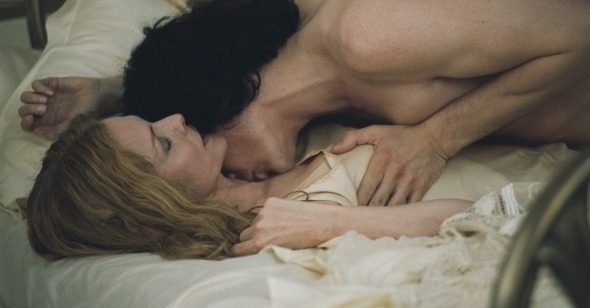Coming of Age
By Michael Koresky
Chéri
Dir. Stephen Frears, U.K., Miramax
Stephen Frears’s version of Colette’s novel Chéri, adapted by Christopher Hampton, is ostensibly an examination of an aging Michelle Pfeiffer. A retired, past-her-prime courtesan in belle époque Paris, Pfeiffer’s Léa de Lonval still wears her beauty well, yet the lines on her washed-out visage are difficult to ignore. There’s no doubt that Pfeiffer is brilliantly cast as this worn-down yet still vital woman, as her face, despite some unignorable tightness about the cheekbones, is beginning to show its age; her impeccable, carved beauty remains, yet in a stricter, more severe, perhaps even more divine tone. In Chéri, Pfeiffer, as always, makes for a welcome camera subject, though in a perhaps unavoidable turn of events, the film lavishes most of its attention on rigorous youth, i.e. the face and body of her young lover. As Chéri, the spoiled dandy son of her nasty rival ex-courtesan Madame Peloux (Kathy Bates, doing her fussbudget routine from Revolutionary Road), Rupert Friend is Pfeiffer’s perfect complement: with his aquiline nose, rosebud lips, and alabaster skin, he also has a harsh beauty, but one tied to the frivolities of youth. At first, Chéri seduces the beautiful 19-year-old lad for mere sexual gain, and clearly due to some unspoken one-upmanship with his mother, who watches her come-ons from a nearby window; but six years later, he remains her bedfellow, and, unheralded, their lust has become love.
This is basically where Chéri’s narrative proper begins, as Léa’s taking the boy to bed mostly makes for prologue, which Frears bounds over in rather zippy fashion. If only the rest of his film could have stuck to this momentum. What follows is a rather lugubrious affair, detailing the sexual and emotional withdrawal the two experience when torn apart by social custom. The increasing darkness of Chéri only sheds light on the inappropriateness of its fleet early moments, which include a bouncy montage credit sequence describing “whores of every description,” with faux-didactic voiceover and cartoonish “period” imagery. Such frilly foolishness promises a much lighter film that what arrives and in retrospect smacks of last-minute desperation on the part of the producers or perhaps studio. Similarly, the crazily emphatic score by Alexandre Desplat throughout seems to have been amped up in order to make dramatic and palatable what might have been overly somber and motivationally subtle; rather it comes across as intrusive and often atonal.
Basically, Frears seems to not have much of a handle on the material—is the film farce (as early ribaldry and much randy bedding, accompanied by thrown platters of oysters and prawns, portends) or a slow-burning tale of doomed romance, in which the two lovers, with their pale skin and rigid countenances, look like two marble statues mating? Frears’s tone may be wavering (as is often the case with his period pieces, such as Dangerous Liasions and Mrs. Henderson Presents, which often trade equally in goofy pageantry and weighty drama), but his atmosphere is consistent: from camera prowls through Maxim’s to shadowy backroom opium parlors, the film’s sets are dramatic and cluttered, its costumes showy and bold, though neither in that focused, detailed fashion in which a director such as Scorsese or Davies might have burrowed slyly past the surface of things. There’s no texture to the window dressing, just a parade of prettiness, even when Léa finds herself alone, drowned in ornamental solitude.
Despite the lack of a strong authorial vision to guide them, Pfeiffer and Friend are mostly compelling, her for her sharp, laserlike focus and, as always, her empathy (it’s one of the things that has set the icily beautiful actress apart from impenetrable, self-possessed movie goddesses like Angelina Jolie or Nicole Kidman); he for his rich mix of youthful bravado and withering indecisiveness. When Chéri is forced by his mother into an arranged marriage, Léa enters a long-suffering stage, and the loss slowly eats away at her. Pfeiffer’s good at quiet implosion (see The Age of Innocence), and she’s able to give Chéri’s final scenes a dignity they may not have had with another actor, imbuing her closing lines with an attractive combination of the sensual and the maternal. If the film had felt like it earned this final outpouring of emotion, and if we felt like we got to know the character’s inner life and how she defines herself other than as just a young man’s lover, then Pfeiffer’s performance would have registered as more than just a poignant outline.
